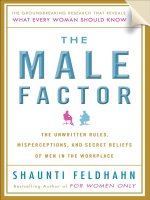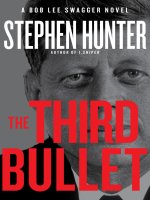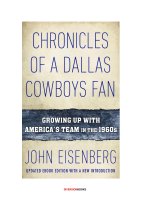THE THIRD BULLET by Stephen Hunter (Special Sneak Preview!) pptx
Bạn đang xem bản rút gọn của tài liệu. Xem và tải ngay bản đầy đủ của tài liệu tại đây (2.62 MB, 28 trang )
Purchase your copy of
The Third Bullet
from one of these retailers
Order a copy:
Download:
Facebook.com/StephenHunter
SimonandSchuster.com // Simonbooks.tumblr.com
@simonbooks // Facebook.com/SimonandSchuster
Simon & Schuster
NEW YORK LONDON TORONTO SYDNEY NEW DELHI
Stephen Hunter
A BOB LEE SWAGGER NOVEL
The Third Bullet
9781451640205TEXT.indd 3 10/23/12 10:52 AM
I think it’s time we stop, children, what’s that sound?
Everybody look what’s going down.
—“FOR WHAT IT’S WORTH,”
BUFFALO SPRINGFIELD
9781451640205TEXT.indd 7 10/23/12 10:52 AM
PART I
U.S. A.
“There’s something happening here”
9781451640205TEXT.indd 1 10/23/12 10:52 AM
3
CHAPTER 1
Baltimore
T
he sidewalk before him bucked and heaved, blown askew by
high winds howling through the night.
Oh, wait. No. Let’s edit that. There was no bucking and
heaving. Ditto with the “blown askew” and the “high winds howling
through the night.”
It just seemed so to Aptapton, because the winds that toyed with
the stability of the sidewalk blew—“howled”—only through his own
mind. They were zephyrs of vodka, and they’d substantially loosened
his grip on the solidity of the little chunk of earth that lay between
the bar he’d just exited and the house where he lived, a few hundred
yards ahead.
Aptapton: alcoholic, writer, success, melancholiac, and gun guy,
was in a zone that might be called greater than a buzz but less than a
full staggering drunk. He was one sheet to the wind, you might say,
happyhappyhappyhappy, as three vodka martinis will do to a fellow
with only moderate capacity for drink, and what lay ahead, although
slightly challenging, didn’t really seem insurmountable. After all, he
had to walk only another few feet, cross the street, and then—
Digression. Pause for autobiographical interlude. It’s allowed
when under the influence. One thing suggests another, and in this
case the suggestion is appropriate.
The street was called Light, and that suggested a kind of hopeful
conclusion to the evening. Light as in light of heart, light of spirit,
light at end of tunnel, light as in amusing, fey, witty, light as symbol
9781451640205TEXT.indd 3 10/23/12 10:52 AM
4 s 34%0(%.(5.4%2
of hope and life. But also: Light as in Light for All, as a famous news-
paper, located a mile or so up the very same Light Street, had pro-
claimed on a daily basis for 175 years or so, twenty-six of which he’d
spent in its employ and where his wife to this day toiled.
Yes, he was that James Aptapton, minor local journo celeb who’d
gone on to minor fame as a writer for money of hardcover books
about gunfights and the stoic heroes who won them, and now he
found himself at sixty-five improbably successful (in a small way)
and awkwardly pleased to be himself. He had it all: beautiful wife, a
couple of mil, a nice house in a fabulous part of town, a minor repu-
tation (enough to take some pleasure in), a grand future, a munifi-
cent multibook contract, a really cool project ahead, and a lot of guns.
The reason for the three vodka martinis was liberation, not cel-
ebration. His wife was absent, ha ha ha, too bad for her. She was
at some newsroom woman thing, birthday party, maybe—why did
women take birthdays so seriously, by the way?—and so he’d wan-
dered on his own to the nearby bistro, had a burger with a Bud and
then V.1, which weakened his resolve to resist V.2, which shattered
his resolve to resist V.3. Fortunately, there’d been no V.4, or he’d be
asleep in the men’s room.
Now.
Where was I before digression?
What place is this?
Where am I now?
Ha ha ha ha.
Oh yes: home is the hunter. He. Was. Walking. Home.
The street slanted, then rolled. Ahead, it humped up, then dipped
down to permit a view of the valley. It rocked. It rolled. It shook, it
rattled, it coiled, it double-bubbled, boiled, and troubled.
He laughed.
Do you find yourself amusing? his wife always asked, and the
truth was, yes, he did find himself amusing.
The mood, like the geography, chemically amplified by red potato
9781451640205TEXT.indd 4 10/23/12 10:52 AM
4(%4()2$"5,,%4 s 5
crushed by kulak descendants, was quite good. That James Aptapton
had been recognized. It happened. Rare, but not without precedent
for your minor-league non-qual-lit celeb.
“Mr. Aptapton?”
Halfway through V.3, he’d looked up to see an earnest young fel-
low, possibly the assistant manager.
“I just wanted to say, I’ve read all your books. My dad turned me
on to them. I really, really love them.”
“Well,” said Aptapton, “say, thanks so much.”
The young man sat and gushed Aptapton love for a bit, and Aptap-
ton tried to give him a meaningful Aptapton experience. The transac-
tion worked out well for both of them, in fact, and at the bottom of
V.3, a pause in the praise gave Aptapton the time to gracefully excuse
himself, bid Tom? maybe Jack? possibly Sam? good-bye and make his
exit. So his mood was mellow and radiant. He’d cross Light Street
here, and only the narrow alley called Churchill lay between himself
and horizontality in bed, his destination.
The Russian watched from the stolen black Camaro parked on Light.
This looked to be the night. He’d been stalking for three days now, in
his patient, professional way, and part of his talent lay in understanding
exactly when the arrangements favored him and when they did not.
Thus, a police scanner played out its truncated cop-speak ten-
code and laconic locality identifiers, and it suggested no police pres-
ence here in the immediate Federal Hill area. Thus, it was late enough
that the action in this night-town district had played itself out and
the streets, though glistening with dew, were largely empty, and only
periodic parties of drunken twentysomethings rolled this way and
that. Thus, finally, the target had emerged, functionally reduced by
alcohol intake and self-love, and bobbed his way along the street.
The Russian saw a man in jeans and a tweed coat with a pair of
writer-like glasses, Trotsky out of Orwell by way of Armani or some
9781451640205TEXT.indd 5 10/23/12 10:52 AM
6 s 34%0(%.(5.4%2
such. You saw glasses like that in New York. The man had a round,
pleased face, bearded after Hemingway and to disguise jowls, nar-
cissism blasting out of him more powerfully than any other human
attribute. Expensive shoes. Nice shoes. A well-turned-out fellow.
Barring the unforeseen arrival of some whimsical force that favors
thriller writers above all others in the world, it was probably going to
happen tonight. The Russian did not believe in whimsical forces: he
believed only in the power of a fast car to break the spine of a poor
unsuspecting fool like this one a hundred times out of a hundred
times. He had seen it, he had done it, he had the nerve and the cool
and the coldness of heart to do such damage without a lot of emo-
tional involvement. He was a professional and well paid.
The target for tonight, joints loosened by the alcohol, managed to
get himself across Light Street without falling. He navigated with that
overcontrol typical of the drunk. Great forward movement, momen-
tum building, but without the capacity of adaptation; he arrived at
where he tended, not at where he aimed, and at the last, lurching
moment, he bumbled through a sideways correction, a sort of exag-
gerated funny-walk bit.
All of this meant nothing to the Russian, who found nothing
funny. He noted distances, angles, and surfaces as a way of comput-
ing acceleration rates into speed on impact. The Russian prosaically
jacked two wires together in the torn-out key unit of the dashboard,
and the beast of a car stirred to life. He was not showy or stylized,
so there was no gunning of the engine to allow the horses under the
hood to roar and the exhaust pipes to bellow steamy toxins. He eased
into first, nudged his way into the empty street, and waited just a bit,
because he needed at least three seconds of acceleration time in the
alley to get to fifty miles per hour, which was the killing impact.
On either side, there was nothing but Baltimore. At the mouth of
Churchill, a church to one side and a typical Baltimore row house
9781451640205TEXT.indd 6 10/23/12 10:52 AM
4(%4()2$"5,,%4 s 7
meant for the miniature people of the 1840s to the other, Aptapton
re-aimed himself and pressed onward down the concourse. It was
listed as a street in city records but had been constructed as an alley
many years ago, its tiny brick dwellings serving as servants’ quarters
or backyard administrative units for the larger houses that faced out-
ward to prouder, wider streets. For a hundred years this back way
had probably been the province of pig and horse shit commingled
with blood and Negro or immigrant sweat, where the invisible serv-
ers lived to sustain the opulent ease of those in the big houses. Then
it became the inevitable slum, but that condition never quite went
terminal, as the dwellings were too cute for demolition. Now, of
course, gentrification had come in the form of museum-quaint cob-
blestones, which gleamed moistly as if at an art director’s bidding,
little mock-gaslight streetlamps, lots of gardening and painting and
each tiny building essentially remanufactured from the inside out, so
that they had become nesting sites for the young urban hip. Aptap-
ton, that Aptapton, began to amuse himself by inventing sexual per-
versions he imagined were ongoing on either side of Churchill. Then
he heard the sound of a car engine.
Agh. This meant he’d have to re-adjust his somewhat sloppily
functioning internal gyro and get himself off the cobblestones and
onto the little shelf of sidewalk. He heard basso profundo, deep-chest
utters, and turned.
He made out the streamlined form of the Camaro one hundred
feet away and felt himself seized in its illumination. A friendly type
always, he raised a hand and smiled, and indicated that he yielded
to superior power and would manfully attempt to arrive upon the
threshold of the curb. At the same time the whole thing reminded
him of something, and it froze him in place as his mind examined
its files.
Finally, it came to him: an image from one of his own books.
Didn’t he do one where the bad guy, some kind of car genius,
used Camaros and Chargers and Trans-Ams to take people out? He’d
9781451640205TEXT.indd 7 10/23/12 10:52 AM
8 s 34%0(%.(5.4%2
thought he ought to get away from guns for a bit, and so he’d moved
on to the high-pro muscle car as weapon of choice. Nobody seemed
to like it very much, however. He’d also tried swords in one, to much
chagrin. He was a gun guy, so he did best when he stuck to his guns.
Anyway, this was setting up sort of like a scene in Thunder’s Eve-
ning, as the one had been called, and he had to laugh (“Are you amused
by yourself?”) at the thing at the end of the alley, hazy in the glare of
its headlights but sleek and black and damp, the odd refraction of
street- and houselights playing magically off its shiny skin, film noir
to the very end.
It’s from my id! he thought.
In the next second it accelerated.
It came at a speed he’d never imagined possible, as if it had gone
into warp drive, blurring the stars, and well before this information
could be processed, he was airborne.
He was airborne.
There was no pain, though the blow he’d been delivered must
have been a mighty thud. Again, when he rejoined Earth in a heap
of breakage and ruin, there was no pain. He lay askew on the cob-
blestones, thinking, Oh, she’s going to be so mad at me, because he
knew he was in big trouble with his wife.
9781451640205TEXT.indd 8 10/23/12 10:52 AM
9
CHAPTER 2
Idaho
I
n Cascade, everybody goes to Rick’s. Even Swagger.
He showed up every once in a while, maybe three, four times
a month, preceded by myth, isolated by reputation, and cloaked
in diffidence. He sat alone, if he came, at the counter, and had a cou-
ple of cups of coffee, black. Jeans, old boots, some kind of jacket, and
a faded red Razorbacks ball cap. He could have been a drifter or a
trucker or a rancher or a gunfighter. The body was rangy, without fat,
slightly tense, also radiating signals of damage. He always arrived, if
he was to arrive at all, at 5 a.m. with the ranchers. It was said he had
trouble sleeping—said, that is, by Swagger watchers, since the man
himself spoke hardly a word—and if he was still awake when the sun
cracked the edge of the world, he’d drive from his place out on 144 to
Rick’s, not so much to join in the community but to reassure himself
that community was there.
That was pretty much Rick’s purpose in the general scheme of
things. The food wasn’t much—it was primarily a breakfast place
whose short-order cook knew every way to wreck an egg and had the
gift for the right fusion of crunch, grease, and chew to pan-fried pota-
toes—and the early risers—who drove the Cascade economy, paid
the taxes, hired the Mexicans, guided hunters for a week or so in the
fall, and plowed the roads—always stopped there to fuel up for what-
ever the long day of honest labor held in store. Swagger, though no
glad-hander, seemed to like the company, to enjoy the ranch badi-
nage and the talk of Boise State football and the weather complaints,
9781451640205TEXT.indd 9 10/23/12 10:52 AM
10 s 34%0(%.(5.4%2
because he knew no fool would come up to him with questions or
requests or offers, and that these sinewy gentlemen, themselves josh-
ers but not speech givers, always played by the rules.
As for them, they knew only what they’d heard, though they
weren’t sure where they heard it. War hero. Retired marine. Lots of
deep-grass stuff in a war that we lost. Supposedly the best shot in the
West, or at any rate, a hell of a shot. Gun guy, got a lot of stuff from
Midway USA and Brownells. A late-arriving daughter, Japanese by
birth, who was the twelve-and-under girls roping champ and seemed
born to horseback. Beautiful wife, kept to self, running the barns the
family owned in three or was it four states. Business success. Knew
of the big world and chose to live in this one. Out of a movie, some-
one said, and someone else said, Except they don’t make them kinds
of movies no more, and everybody laughed and agreed.
That was the easy truce that reigned at Rick’s, and even Rick and
his two gals, Shelly and Sam, seemed okay with it. That is, until the
Chinese woman showed up.
Well, possibly she wasn’t Chinese. She was Asian, of an indefinite
age somewhere between young and not young, with a strong nose
and dark, smart eyes that could pierce steel if she so desired. Though
she seldom showed it, she had a smile that could break hearts and
change minds. She was short, rather busty, and looked pretty damned
tough for someone who was probably soft in all the right places.
She showed at 5, took a seat at the counter, ordered coffee, and
read something on her Kindle for two hours. At 7, she left. Nice tip-
per. Pleasant, distant, not an outreacher, but at the same time com-
pletely unfazed by the masculine brio of the 5 a.m. ranch crowd at
Rick’s.
She came every day for two weeks, never missing, never reach-
ing out, maintaining her silence and her secrecy. It didn’t take the fel-
lows long to figure out that none of them was of interest to a crafty,
contained beauty, so she had to be there for Swagger. She was stalk-
ing him. A reporter, a book writer, a Hollywood agent, somebody
9781451640205TEXT.indd 10 10/23/12 10:52 AM
4(%4()2$"5,,%4 s 11
who saw a way to make some bucks from whatever secrets Swagger’s
war mask of a face concealed without murmur or tremor. Yet when
he came in, she made no move toward him, nor he—he noticed her
instantly, as he noticed everything instantly—toward her. They sat
with an empty stool between them at the counter, each drinking
black coffee, while she read and he ruminated or remembered or
whatever it was he did when he came in.
This ritual continued for another week or two, and it consumed
the Cascade gossip circuits, such as they were. Finally, almost as if to
satisfy the town gabbers instead of any genuine impulse of his own,
he walked over to her. “Ma’am?”
“Yes?” she said, looking up. In the light, he saw that she was quite
beautiful.
“Ma’am, it seems the fellows here believe you’re in town to have
a chat with a man named Swagger. I’m Swagger.”
“Hello, Mr. Swagger.”
“I wanted to spare you any more trouble, because I imagine you’ve
got better places than Rick’s in Cascade, Idaho, to spend your time. I
have essentially retired from the world, and if you’re here to see me,
I have to disappoint you. I don’t see anyone. My wife, my daughters,
and my son, that’s about it. I just sit on a rocking chair and watch the
sun move across the sky. I don’t do a thing no more. My wife does the
work. So whatever it is you want, I’m sparing you the time by telling
you it’s probably not going to happen. And this is more than I’ve said
in a year, so I better stop while I’m ahead.”
“That’s fine, Mr. Swagger,” she said. “Time isn’t the issue. I’ll stay
years if I have to. I’m in this for the long haul.”
He didn’t know what to say in response. He just knew he had no
need whatsoever to go back to what he called, in the argot of that war
so many years ago, The World. Each time he went, it seemed to cost
him. The last time it had cost him a woman he’d allowed himself to
care about, and he did not relish a revisit to that grief, at least during
waking hours. He had enough to worry about with two daughters
9781451640205TEXT.indd 11 10/23/12 10:52 AM
12 s 34%0(%.(5.4%2
and a son, and at sixty-six, with a steel ball for a hip, enough scar tis-
sue across his raggedy old body to show up on satellites, and so many
memories of men dying, he needed no more adventures, no more
losses, no more grief. He was afraid of them.
Then she said, “I know about you and what you did in the war. It
seems to be a profession that prizes patience. You sit, you wait. You
wait, you wait, you wait. Isn’t that right?”
“Waiting is a part of it, yes ma’am.”
“Well, I can do nothing to impress you. I can’t shoot, ride, climb,
or fight. No book I’ve read would amaze you, no accomplishment
I’ve achieved would register on your radar screen. But I will show
you patience. I will wait you out. This week, the next, this month,
the next, on and on. I will wait you out, Mr. Swagger. I will impress
you with my patience.”
It was a terrific answer, one he’d never counted on. He let no emo-
tion cross the Iron Age shield that was his face. Possibly he blinked
those lizard eyes, or ran tongue over dried lips, as he was a dry old
coot, wary and contained, who made noise when he moved because
one adventure or another had left him with a limp, and even if the
wind and the sun had turned his face the color of Navajo pottery, his
eyes had somehow bled themselves of color and were reptilian irises,
untainted by empathy.
“Yes ma’am,” he said. “So we’ll wait each other out.”
It took over three weeks. Each time he showed, he thought she’d
be gone. But there she was, tucked away in the corner, not looking
up, her face illuminated by the glow of the reading machine or what-
ever it was. He skipped for ten days straight and assumed that would
surely drive her away. It did not.
Finally, halfway into the fourth week, she went to her rented car
in the general cloud of pickups pulling out for the day’s first duty
station and found his truck, a black Ford F-150, next to hers. He
lounged against its fender, ropy and lean in his baseball cap, a high-
plains drifter, a Shane, a truck driver off the interstate.
9781451640205TEXT.indd 12 10/23/12 10:52 AM
4(%4()2$"5,,%4 s 13
“All right,” he said. “If you were in this for money, you’d be long
gone. If you’re crazy, the jabbering of those old men in this joint
would have sent you off to the nut bin. What I’m getting is some kind
of stubborn in you that usually equals high purpose. You win. I’ll give
you what you want, as much as I can and stay my own man.”
“It’s not much,” she said. “No, no money, no contracts, no angles.
I’m not from a big flashy city, just a blue-collar rust bucket called
Baltimore. I want your judgment, that’s all. You know things I don’t.
I want to put something before you, and then I want you to tell me
if it’s anything or if it’s craziness, coincidence, whatever. That’s all,
except I forgot the best part: it’s very dull and boring.”
“All right,” he said, “you have earned the right to bore me. I can
be bored, it’s not a problem. Can you meet me at the T.G.I.F.’s off
the interstate in Iron Springs tomorrow at two? It’s a craphole, but
it’s crowded and loud and nobody’ll notice a thing. We’ll drink coffee
and talk. I chose that place because I don’t want the old goats in this
place all giddy over seeing us.”
“Fair enough, Mr. Swagger. I’ll see you there.”
She was punctual and found him sitting in a booth in the rear of the
gaudy place, whose cheesy cheerfulness seemed in counterpoint to
his grave countenance and all the hollows and planes of his tight old
face, with its deltas of fissure extending from each eye like the bro-
ken cataracts of an ancient river of kings. Or maybe, sans the warrior
romance, he was just a beat-to-hell old guy. Meanwhile, the kind of
citizen who defines the interstate as freedom and paradise swirled
and bobbed through the busy place, raising clamor, eating ice cream,
yelling at children, and exhibiting all the discontents of motorized
civilization that one can manage.
“Ma’am? Say, I don’t even have a name for you.”
She sat across from him. “My name is Jean Marquez. I’m Fili-
pino by heritage, born and raised here. I am a journalist by profession,
9781451640205TEXT.indd 13 10/23/12 10:52 AM
14 s 34%0(%.(5.4%2
though this is not about a story, and I’m not working for my newspa-
per. I’m the daughter of two doctors, fifty-five years old, and a widow.”
“I’m sorry to hear of your loss, Ms. Marquez. I’ve lost some very
close people and understand the hurting.”
“I thought you might. Anyhow, you should call me Jean. Every-
body does. My husband was named James Aptapton. Does that name
mean anything?”
“Hmm,” he said, and somehow, yes, it did. His mind and face
fogged in search, and finally, he said, “I’m coming up with some kind
of writer. Wrote about snipers? Knew guns, is that right? Don’t believe
I ever met the fellow or read his books, but I’d run into the name here
and there. I’d get asked, now that I remember, if I was some hero he
wrote about, Billy Don Trueheart, something like that?”
“Something like that. Yes, Jim was a gun guy. He was one of
those men who loved guns, and if you lived with him for twenty
years, as I did, you got used to guns everywhere. He eventually got
wealthy enough to spend seventeen thousand dollars on a Thompson
machine gun. If you want to rent a Thompson machine gun, let me
know. I can let you have one at an affordable daily rate.”
“I’ll bear that in mind, but I hope my Thompson days are long
over.”
“Anyhow, the guns everywhere, the gun magazines, the biogra-
phies of people like Elmer Keith and John M. Browning, the dead
animal heads, all that, that was who he was, and I knew that going
in and accepted it. His politics, never, but the gun thing, it was okay
because he was also funny about it, as he was funny about everything.
He was also kind, and even when he became successful, he never
turned into an asshole and stayed true and decent to his kids and my
family and his mother and the people he knew. It was never about
getting to the table where the cool kids sat. It was about buying guns,
drinking vodka, and making people laugh. Everyone who knew him
is missing him and will for a long time.”
“Is this about his death?”
9781451640205TEXT.indd 14 10/23/12 10:52 AM
4(%4()2$"5,,%4 s 15
“Yes. The idiot went to a bar one night and had three instead of
the allowed one martini. He walked home, reflexes all messed up,
and managed to get himself killed by a hit-and-run driver. It was
merciful, they say, he went fast.”
“I’m sorry. Did they catch the driver?”
“No. That’s part of the issue. It seems that over two thousand
people a year are killed by hit-and-runs, and about ninety-eight per-
cent of those cases are solved. There are those that aren’t, and it is
remotely possible that he was murdered. I know, I know, it was prob-
ably some kid high on meth in a hopped-up car who saw an old
guy staggering down the street and stomped on the pedal. For kicks,
for laughs, for the warm and fuzzy memories, I don’t know. But . . .
maybe not.”
“I have had experience with a man who killed by car. It’s more
than possible. Driven by a professional, it can be a lethal instrument.
I suppose you’re going to tell me why this could be a murder.”
“I am. We are at the boring part. Maybe you’d better pour your-
self a cup of coffee.”
“I like your husband. I like you. It’s fine. Go on, try to bore me.”
“As I say, it’s a story in which almost nothing happens. It has no
vivid characters, no sudden turns of fate, no dramatic reversals, no
humor, no drama. It’s about something that happened in a workplace
a long time ago.”
“So far, so good.”
“It can’t be verified. It’s hazy in parts. It might be a hoax, though
it’s so dreary, I can’t imagine how anyone could gain anything off it. I
don’t have the exact dates. It was first told in a letter, then years later
in another letter, then years after that in a third letter. I’ve read none
of the letters, and the passage of time between each installment sug-
gests the erosion of failing memory. On top of that, my only expe-
rience with it was as told to me by my husband, and I must confess
I didn’t pay much attention, so my own memory is questionable as
well. All in all, as evidence of a crime, it’s a pretty pathetic deal.”
9781451640205TEXT.indd 15 10/23/12 10:52 AM
16 s 34%0(%.(5.4%2
“It must linger?”
“It does indeed linger. People can’t quite put it aside. They think
they have, and go about their lives, and then it comes back in the
middle of the night and pokes them awake. It did that to the three
letter writers and to my late husband. It did it to me enough times
that I found out about a Mr. Bob Lee Swagger and tracked him to a
flyspeck diner in a dying wide-spot in the road called Cascade, Idaho,
and invested close to two months in earning an audience with him.”
“The lingering part is very interesting. So far, you’ve got me
hooked.”
“We start with a young man, a recent graduate of an engineering
school in Dallas, Texas. The time is unknown, but I’m guessing mid-
seventies. He’s smart, ambitious, hardworking, decent. He wants to
join a construction firm and engineer giant buildings. The first job he
gets is entry-level, for an elevator contractor.”
“Elevators?”
“Right. Not exactly the glamour trade. But elevators, which we
all take for granted, are heavily engineered. That is, they are overde-
signed, overmaintained, overregulated, and no one involved with
them takes them for granted. His firm installs them and maintains
them on contract so they can pass their yearly examinations and don’t
drop ten people fifty stories.”
“Sounds reasonable.”
“It’s hard, crummy work. The shafts and ‘engine’ rooms, as they
call the motor and pulley devices that make them run, are dark,
poorly ventilated, and not air-conditioned. Even more so back then.
The space is cramped, and it involves a lot of twisting and bending
to get access. The work is intensive and highly pressurized, because
the building managers hate it when they have to shut down the ele-
vators and the tenants hate it and everybody hates it. Are you getting
a picture?”
“I am.”
“This young man and his crew are in the engine room on the roof
9781451640205TEXT.indd 16 10/23/12 10:52 AM
4(%4()2$"5,,%4 s 17
of a particular building, and they’ve set up lights, and they’re measur-
ing cable wear, gear wear, electrical motor wear, lubricating, trying to
work fast so they can get the box, as they call it, back in service. It’s
hot, crowded, and except for the light beams, dark. Not pleasant, not
happy, and suddenly—kaboom.”
“Kaboom?”
“One of the workers, maybe resting, maybe backing away to make
room for someone else, maybe doing whatever you do in an eleva-
tor engine room, bumps into something on the wall, and there’s a
loud crash and the sound of stuff falling to the ground, a big cloud of
acrid dust, everybody’s coughing and wheezing. All the flashlights go
onto it, and they discover that he’s bumped into a shelf on the wall,
and for whatever reason—the screws rusted or came out, the brick
or stucco or whatever gave way, the metal itself sheared—when he
jostled it, it collapsed, dumping its pile of whatever was stored there
to the ground. That’s the action scene, by the way. The shelf falling,
that’s as exciting as it gets.”
“My heart’s beating so fast, I can hardly stand it.”
“Here’s the really boring part. They figure out what’s wrong with
the shelf, and somehow get it remounted, and start restacking the
stuff on it. The stuff is carpet remnants. That is, the lobby of the
building has a big carpet, and they ended up with remnants that they
had to keep around for patching or whatever, so they had a shelf in
the engine room and someone decided that would be a good out-of-
the-way place to store the remnants.”
“Sounds pretty top-secret to me.”
“And someone says, ‘Hey, look at this.’ Be cool if it was a rifle,
huh? Or a box of ammo, a telescopic sight, a spy radio, something
really James Bond?”
“That would be very interesting.”
“Sorry. It’s just a coat. I told you it was a boring story.”
“It ain’t without interest. Please go on.”
“It turns out to be a man’s overcoat, XL, tan gabardine, fairly
9781451640205TEXT.indd 17 10/23/12 10:52 AM
18 s 34%0(%.(5.4%2
high-quality, in extremely good condition. Maybe almost new. It had
been methodically folded and slid into the pile of carpet remnants in
the engine room sometime in the past. Again, no dates, no specifics,
nothing.”
“I’ve got it,” said Swagger.
“They unfold it and immediately make a discovery. It stinks.
Unfolding it puts out some kind of chemical stench, very unpleas-
ant. Flashlights go onto it. It seems that the left breast wears a rather
gaudy petro or chemical stain, and even now, who knows how many
years later, the odor of that stain is powerful. It hasn’t gone away.
Instead of finding a free coat, they’ve found a fixer-upper, which
would involve dry cleaning, which might or might not get the stain
and the smell out, and no one is interested, and so it goes into the
trash. It is thrown out. It disappears. It is gone forever. End of story.
Not much of a story, is it?”
“No, but I give you it’s got some moments,” Bob said. Somewhere
in his rat-pointed tactical brain, he was beginning to play with them.
Something had been subtly provoked. Dallas. Abandoned overcoat.
Strange smell and stain.
“Okay,” she said. “The Engineer is promoted, and he leaves the
firm and goes to that big construction outfit. Again, he is promoted,
because he’s very intelligent and hardworking. He’s the type that
built America. He becomes a partner. He marries his high school
girlfriend, they have three beautiful daughters and move to the sub-
urb where partners live. He joins a country club. He becomes ven-
erable. His daughters marry wonderful men. I’m actually making up
the details, but you get the picture. One of the daughters becomes
engaged to the son of a rancher, another prosperous fellow. The
Rancher and his wife invite the Engineer and the wife out for a get-
to-know-you weekend and barbecue. They’re sitting there in the big
paneled living room looking out the picture window to the swim-
ming pool and the white horse fences and the green meadows, and
the Engineer notices something: dead animals all over the place.
9781451640205TEXT.indd 18 10/23/12 10:52 AM
4(%4()2$"5,,%4 s 19
Turns out the Rancher is a hunter. He’s been all over the world. Lions
and tigers and bears. Ibexes and sables and kudus. They’re all drink-
ing highballs and having a good old time and the Rancher says, ‘Say,
Don, care to see the shop?’
“Don nods and off they go. They walk into a big gun place. Guns,
heads, safes, benches, targets, photos of men with dead animals,
maybe an old Marilyn calendar, tools, all that, the sort of thing my
husband had, although I’m guessing this Rancher kept his a lot neater
than my husband did. And whammo, the Engineer is hit by an odor.
It’s an old, old odor. I don’t know if you know it, but psychologists
consider olfactory cues the strongest reminders. A smell can take you
back to a time and place and re-create cues to all the other senses. So
suddenly, you’re back where you were when you first hit that smell,
and of course, Don is back in the engine room of the elevator in that
building in Dallas thirty-odd years ago.”
“GI or Hoppe’s 9?” Bob asked.
“Hoppe’s,” she said. “Yes. Barrel solvent. Chemical cleaning fluid
especially for guns. Been around since the twenties. That’s what Don
smells in his new pal’s shop, and he realizes that’s what he smelled all
those years ago in the building that I of course didn’t name.”
“You’re going to tell me it was the Texas Book Depository?”
“If only. No, it’s the building across Houston Street from the
Texas Book Depository. It’s called the Dal-Tex Building. It was there
in 1963 too. Dal-Tex doesn’t mean Dallas, Texas, but Dallas Textiles,
as it was the headquarters of the Dallas wholesale garment industry.
Actually, Abraham Zapruder’s office was there, along with a hundred
other offices. Nothing particularly special except that it did offer close
to the same angle and elevation down Elm Street next to Dealey Plaza
that our friend Lee Harvey Oswald used. You can see why it lingers.”
“I can,” said Bob, trying to conjure the structure from a rush of
image memories of Dealey Plaza, that triangle of grass at the heart
of American darkness. He got nothing, no vision, no sense of place.
“It’s figured in a few of the thousand conspiracy theories. I checked
9781451640205TEXT.indd 19 10/23/12 10:52 AM
20 s 34%0(%.(5.4%2
into them; none of them are that interesting or convincing. Someone
claims that a photo shows a rifle on a tripod on the fireplace, but it’s
just shadows. There were some ‘arrests’ after the building was closed
down a few minutes after the shooting, but nothing came of them.
Some people claim without evidence that it was one of the nine or is
it twelve shooting sites that the CIA, Sears, Roebuck, the Canadian
Air Force, and Proctor and Gamble used in their conspiracy. All in
all, it’s not much.”
Bob nodded.
“But it lingers,” she continued. “For the Engineer, particularly. He
can’t get it out of his mind. You see why, don’t you?”
“The Hoppe’s suggests that someone had need to clean a rifle,
which suggests the presence of a rifle. And you can assume the juice
was somehow spilled or leaked onto the coat during the cleaning pro-
cess. But the coat was carefully hidden, as if whoever had spilled the
Hoppe’s, with its chemical smell, didn’t want it exposed to the pub-
lic eye or nose. Lots of folks in Texas would recognize it right away,
including most policemen. It was the universal gun cleaner then. All
this could have happened on or around November 22, 1963. There’s
your lingering. It puts a rifle where there ain’t been one. But it is thin.
It’s real thin.”
“It gets thinner. A few more years pass. The Engineer doesn’t
know what to do about it. He’s no dummy; he gets how thin it is too,
way too thin to take to law enforcement. Then he reads a book. The
book is called Shootout on Pennsylvania. It was written by my husband
and a friend. It’s the story of an assassination attempt on Harry Tru-
man in 1950 that ended up in a gunfight in the middle of the street
in the middle of the day in the middle of downtown Washington,
right across from the White House. Two men dead, three wounded.
Almost totally forgotten. Anyhow, the Engineer reads the book. He
reads in particular about a Secret Service agent named Floyd Bar-
ring, who was in command of the watch at Blair House, where the
fight happened, and was considered the hero. He shot one of the bad
9781451640205TEXT.indd 20 10/23/12 10:52 AM
4(%4()2$"5,,%4 s 21
guys in the head and took him down and maybe saved Harry Tru-
man’s life. The Engineer finds from the book that Floyd is still alive
and that, thirteen years after being a hero in Washington, he was the
agent in charge of the Secret Service advance party for the Dallas trip,
and was in Dallas for the assassination and testified before the War-
ren Commission and all that. The Engineer takes a shine to Floyd,
who seems upright, decent, hardworking, committed. Since Floyd is
retired yet invested in the assassination, he seems like a candidate to
hear the Engineer’s tale. So here’s the first letter: the Engineer writes
to Floyd and details everything I have laid out to you.”
“You never read the letter, however.”
“Not even close. I’m telling you more or less what I later heard
from Jim when I wasn’t listening hard.”
Swagger nodded, seeing the old agent getting the thick packet
from an unknown person in Dallas and slowly considering its con-
tents. “What did this Secret Service guy do?”
“For whatever reason, nothing. In fact, he probably threw it out.
Crazy Kennedy bullshit, you know the drill. He was sick of it, as he’d
figured in some theories too, and he didn’t like it. He was also in ill
health, living in a geriatric apartment in Silver Spring, mourning the
death of his wife, and knew he didn’t have much time.”
“I see.”
“Yet it lingered. He couldn’t put it out of his mind. A few years
after that, he writes a letter—half a letter—to my husband. He never
finishes it. He never sends it. Maybe he thinks better of it. Who
knows? Anyway, he dies. And that would seem to be that. No more
lingering. The lingering is over. But then: his daughter finds the let-
ter a few years later. So she sends it on to Jim. So years after the coat
was found, years after the identity of the smell was discovered, years
after it was communicated to a retired Secret Service agent, years after
he died, courtesy of his daughter, it was sent to my husband.”
“And he sees the possibilities?”
“More than most. He’s looking for a project. He has a contract that
9781451640205TEXT.indd 21 10/23/12 10:52 AM
22 s 34%0(%.(5.4%2
calls for a book a year, he’s just finished one, but there’s no rest for
the wicked, and when he gets the half-written letter that Floyd almost
sent him concerning the lost letter the Engineer sent to Floyd, he sees
something. He spends a few days researching, looking at maps, read-
ing books or at least examining them, and then he has some kind of
eureka moment. He claims he’s solved the JFK assassination. I sus-
pect vodka played a part. It turns out he means he has an idea no one
else has had. And he has to go to Dallas. And so he goes to Dallas.”
“Was he successful?”
“He talked to a bunch of people, I think he got into Dal-Tex, he
came back very excited. He started working like a madman. One day
a week later, he goes off to a bar for a drink and ends up with a bro-
ken back and pelvis in an alley.”
“You think he was killed because he was looking into a certain idea
about JFK’s death?”
“I haven’t said that. I’ve spoken only in facts, and the fact is that
now I’m the world’s sole possessor of the story. And it lingers. I can’t
get it out of my head, and the connection between it and Jim’s imme-
diate death by possible homicide won’t let me sleep at night. I have to
do every last thing to make sure that the story is properly processed.
Someone has to deal with it, judge it, assess it, contextualize it, some-
one who knows this stuff and has worked in this world. I have nomi-
nated you for that high honor. So now I ask the question I came all
this way for. Is it anything?”
He let out a large breath.
“What does that signify?” she asked. “You think I’m an idiot? The
whole thing is nonsense? What a colossal waste of time?”
“No. I can see how it provokes. I ain’t denying that. And I’m not
saying I’m a hundred percent Warren Commission lone-gunman
guy. I haven’t looked at it hard enough, but I do think, like you, that
a lot of the ‘theories’ are stuff people dreamed up to make a buck. I
also think that the thing has been looked at so much by so many peo-
ple for so long that it’s highly unlikely there’s anything left unfound.”
9781451640205TEXT.indd 22 10/23/12 10:52 AM









